Pop!_OS, an Ubuntu-based Linux distribution developed by System76, is gaining popularity among developers and Linux enthusiasts due to its user-friendly design, performance, and the ease with which you can customize it to suit your needs.
If you’re a developer who is looking to work with Node.js, you’ll find that Pop!_OS offers a great environment for your projects. In this comprehensive guide, we’ll walk you through the process of installing Node.js on Pop!_OS, ensuring that you have everything you need to start building amazing applications.
Why Use Pop!_OS for Node.js Development
Before we dive into the installation process, let’s briefly explore why Pop!_OS is an excellent choice for Node.js development:
Ubuntu Base
Pop!_OS is built on top of Ubuntu which is one of the most popular Linux distributions. This ensures an excellent compatibility with a wide range of software including Node.js and its vast ecosystem.
Performance
Pop!_OS is optimized for performance which makes it an excellent choice for developers. You can expect your Node.js applications to run smoothly and efficiently.
Customization
Pop!_OS provides a clean and customizable desktop environment. Whether you prefer a minimalistic or feature-rich setup, you can tailor the system to your liking.
Installing Node.js on Pop!_OS
Node.js is a JavaScript runtime that allows you to run the server-side JavaScript applications. It’s a crucial tool for web development and can be installed on Pop!_OS with ease. We’ll guide you through two popular methods: using the official package manager (APT) or using the Node Version Manager (NVM) for more control and flexibility.
Method 1: Installing Node.js via APT
Update the Package Repository
Before installing Node.js, it’s a good practice to update the package repository and upgrade any existing packages. Open the terminal and run the following command:
$sudo apt update && sudo apt upgradeYou will see a similar output to the one in the following:
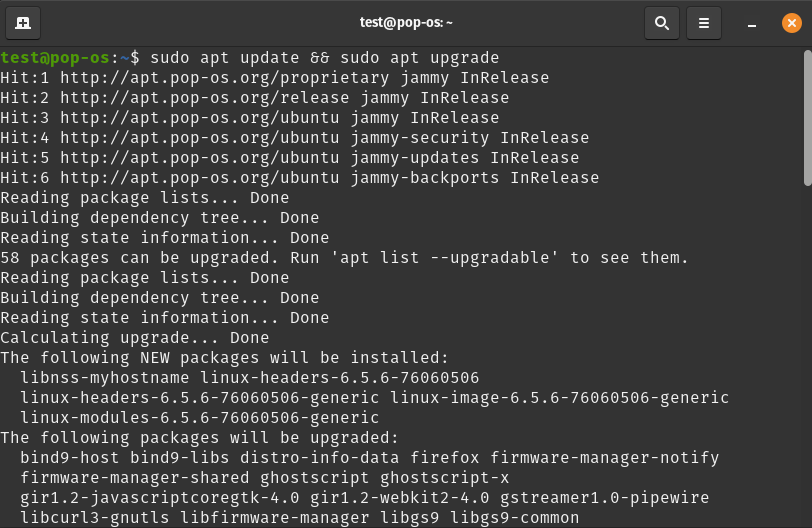
Install Node.js
Pop!_OS, being based on Ubuntu, provides an official package for Node.js. Use the following command to install it:
$sudo apt install nodejsYou will see a similar terminal output to the one in the following:
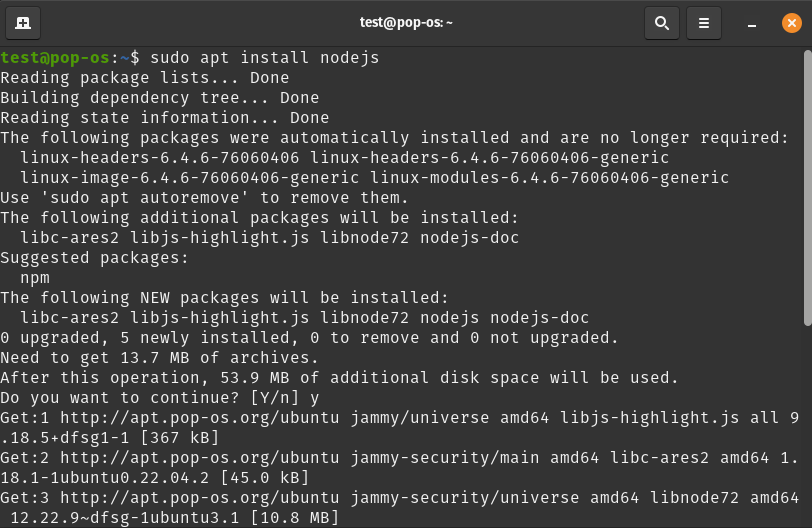
Verify the Installation
To ensure that Node.js is installed correctly, you can check its version using the following command:
$node -v
Method 2: Installing Node.js via Node Version Manager (NVM)
Node Version Manager (NVM) is a popular tool that allows you to manage multiple Node.js versions on your system. It provides greater flexibility which makes it easier to switch between different Node.js versions as needed.
Here’s how to install Node.js using NVM:
Install NVM
Open your terminal and use the following commands to install NVM:
$curl -o- https://raw.githubusercontent.com/nvm-sh/nvm/v0.39.0/install.sh | bashThis command downloads and installs NVM on your system.
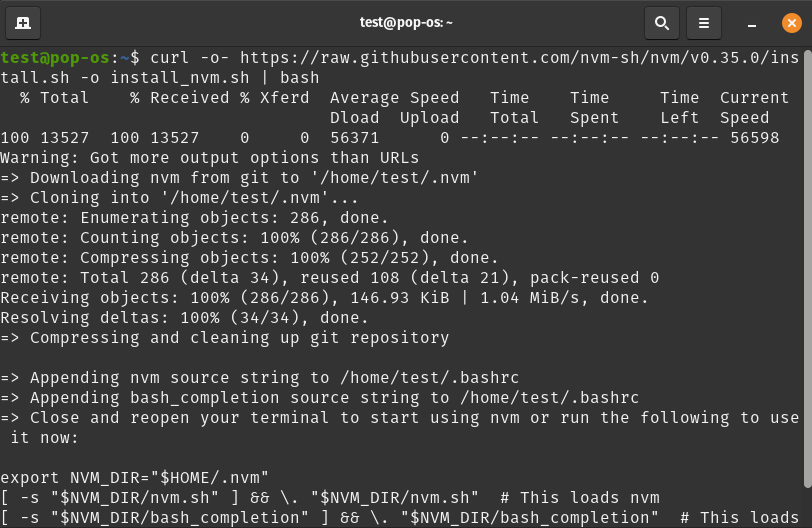
Load NVM
To start using NVM in your current session, run the following command:
$source ~/.nvm/nvm.shThis command loads NVM into your terminal.
Install Node.js with NVM
You can now use NVM to install the version of Node.js that you want. For instance, to install the LTS (Long Term Support) version, run the following command:
$nvm install --lts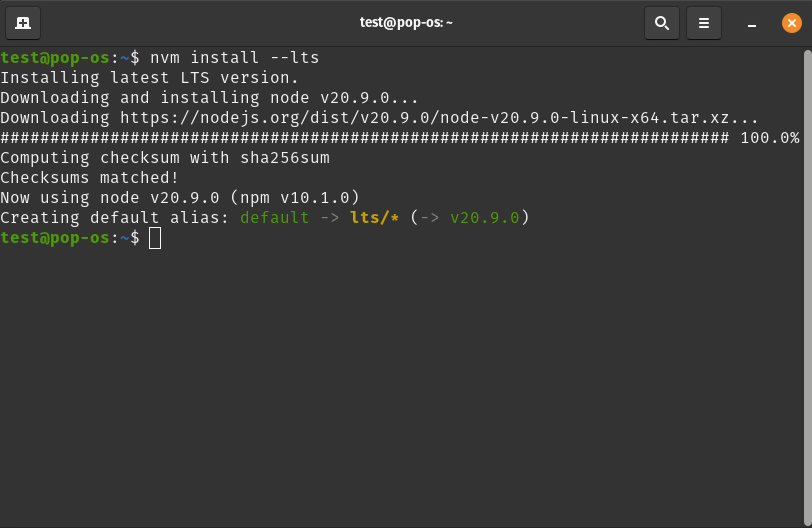
You can check the installed Node.js versions with the following command:
$nvm ls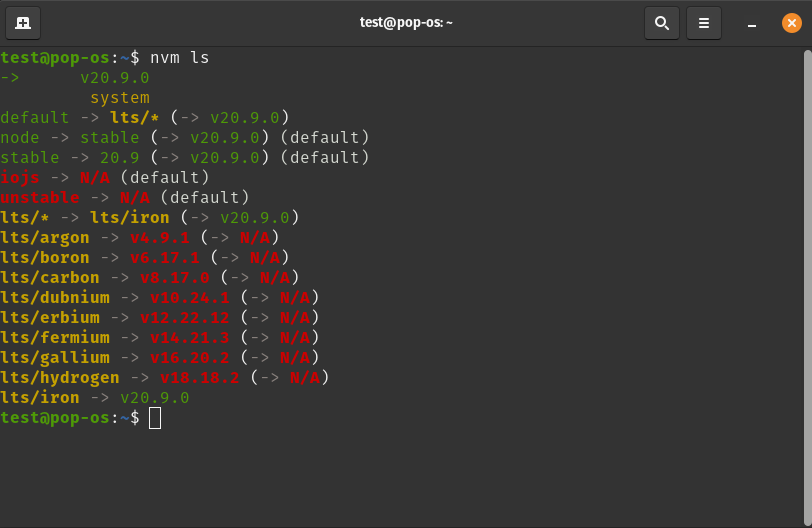
Switch between them using the following command:
$nvm use [version]Note: Replace [version] with your desired Node.js version.
Verify the Installation
After installing Node.js, you can verify the version with the following command:
$node -vYou can also verify npm with the following command:
$npm -v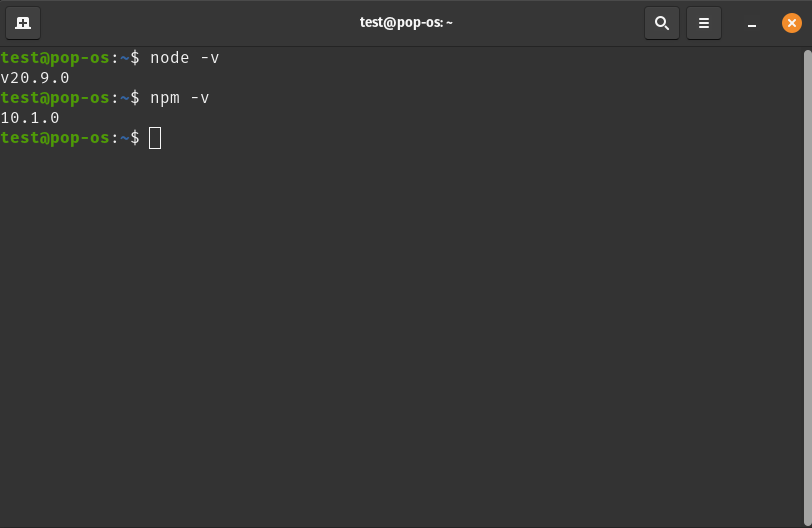
With Node.js successfully installed on your Pop!_OS system, you’re now ready to start developing the Node.js applications.
Using Node.js on Pop!_OS
Now that you have Node.js installed, you can begin building the Node.js applications. Pop!_OS provides a versatile environment for coding, and you can use your preferred code editor or integrated development environment (IDE). Here are a few additional tips to get the most out of your Node.js development on Pop!_OS:
Code Editor
You can use the code editors like Visual Studio Code, Sublime Text, or Atom to write the Node.js code. These editors are well-supported on Linux and offer a range of extensions for Node.js development.
Version Control
Pop!_OS comes with pre-installed Git which makes it easy to manage your source code with version control.
Package Management
Pop!_OS integrates well with npm, the Node.js package manager. You can use it to easily add, remove, and update the packages for your Node.js projects.
Terminal
The Pop!_OS terminal is your gateway to running the Node.js applications. You can use it to execute your Node.js scripts and manage your projects.
Web Development
If you’re working on web applications, consider using the LAMP stack (Linux, Apache, MySQL, PHP/Python/Perl) on Pop!_OS which is known for web development.
Conclusion
Pop!_OS provides a fantastic environment for Node.js development, offering the power of Linux and the user-friendliness of Ubuntu. Whether you choose to install Node.js via APT or use NVM for more version control, you’ll be equipped with the tools that you need to create remarkable applications.
The versatility of the Pop!_OS platform, combined with the Node.js runtime, opens up a world of opportunities for web and server-side development. Mastering the art of Pop!_OS and Node.js is your key to success in the world of modern web development.